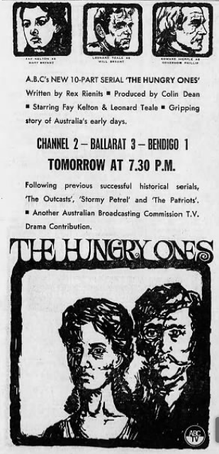Related Research Articles

Skippy the Bush Kangaroo is an Australian television series created by Australian actor John McCallum, Lionel (Bob) Austin and Lee Robinson produced from 1967 to 1969 about the adventures of a young boy and his highly intelligent pet kangaroo, and the various visitors to the fictional Waratah National Park, filmed in today's Waratah Park and adjoining portions of Ku-ring-gai Chase National Park near Sydney.

Love Thy Neighbour is a British television sitcom that was broadcast from 13 April 1972 until 22 January 1976. The show spanned eight series, lasted for 53 episodes and was produced by Thames Television for the ITV network.

Prisoner is an Australian television soap opera, which broadcast on Network Ten from February 27 (Melbourne) February 26 (Sydney) 1979 to December 1986 (Melbourne), though the series finale would not screen until September 1987 in Sydney, where it aired as a three-hour film that was split into three one-hour episodes at the much-later time-slot of 10:30 p.m., running eight seasons and 692 episodes.

Cynthia Jane Williams was an American actress and producer, known for her role as Shirley Feeney on the television sitcoms Happy Days (1975–1979), and Laverne & Shirley (1976–1982). She also appeared in American Graffiti (1973) and The Conversation (1974).

Robert Elmer Balaban is an American actor, author, comedian, director and producer. He was one of the producers nominated for the Academy Award for Best Picture for Gosford Park (2001), in which he also appeared.
Colette Mann is an Australian actress, singer, TV and radio presenter, choreographer and author/writer and media personality, she has been in the entertainment industry for over 50 years.

Amanda Lillian Muggleton is an English Australian theatre, television and film actress. She is best known for her supporting television soap opera role in Prisoner as Chrissie Latham, with appearance between 1979 and 1983.
John Smethurst was an English television and film comic actor. He was best known for his role as Eddie Booth in the British television sitcom Love Thy Neighbour.
Edward Hepple billed variously as Eddie Hepple and Ted Hepple, was an Australian actor, voice artist, producer, director, playwright and television scriptwriter, known for his roles in theatre, television serials, soap operas and TV movies. His well-known roles were as Sid Humphrey in Prisoner and the voice of the prospector in the animated series The Silver Brumby.
The Late Show may refer to:

The Hungry Ones was an Australian television mini-series. It was a period drama about a pair of husband and wife convicts trying to go straight, consisting of 10 30-minute black-and-white episodes, which aired on ABC. Unlike previous serials it was videotaped rather than performed live to camera.
Take That was one of the earliest Australian television series. It debuted in late 1957 and ran till March 1959. As was often the case with early Australian television, it aired only on a single station, in this case HSV-7, in Melbourne.
The Ken Noyle Show is an Australian television series which aired on ABC Television. A half-hour variety series, in Sydney it aired on Thursdays, while in Melbourne it typically aired on Wednesdays.
The Bert Newton Show was an Australian television series which aired from 1959 to 1960. Aired at 6:30PM Saturdays on Melbourne station GTV-9, it was aimed at teenagers and featured acts lip-syncing their songs.
Thursday at One was an Australian daytime television series which aired from 1957 to 1960 on Melbourne station GTV-9. A "programme for the housewife", the running time was as long as two hours.
Women's World was an Australian television series which aired from 1956 to 1963 on ABC. Originally broadcast in Sydney and later Melbourne, it would appear the last couple years of the series were only broadcast in Sydney.
In Melbourne Today was an early Australian television series, which aired in two versions in the 1950s, on Melbourne station GTV-9. It was Australia's first breakfast television series.

"No Picnic Tomorrow" is an Australian television drama one-off which aired in 1960 on ATN-7 in Sydney and GTV-9 in Melbourne. Part of the Shell Presents series of one-off television dramas and comedies, it was produced in Melbourne, but first shown in Sydney on 9 January 1960, and on 23 January 1960 Melbourne.
Man of Destiny is a 1963 Australian television play directed by Christopher Muir. It was based on the 1897 play Man of Destiny by George Bernard Shaw. Just like the play it revolves around the early career of Napoleon Bonaparte.
Robina Beard is an English-born Australian actress, dancer and choreographer. Beard has appeared in numerous stage and TV roles, but is best known as "Madge the Manicurist" in the Palmolive dishwashing liquid advertisements.
References
- ↑ Vagg, Stephen (18 February 2019). "60 Australian TV Plays of the 1950s & '60s". FilmInk . Archived from the original on 15 January 2020. Retrieved 15 January 2020.
- ↑ "Cast in GTV-9 Series". TV & Radio Guide. The Age . 12 December 1963. p. 1. Retrieved 4 May 2020.
- ↑ "Barley Charlie". Classic Australian Television. Archived from the original on 29 January 2013. Retrieved 25 March 2013.
{{cite web}}: CS1 maint: unfit URL (link) - 1 2 3 "GTV-9s new comedy series". TV & Radio Guide. The Age . 9 January 1964. p. 5. Retrieved 4 May 2020.
- ↑ "Australia's Living Archive Annual Report 2010–11" (PDF). National Film & Sound Archive. p. 196. Retrieved 18 April 2023.